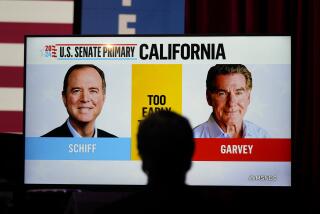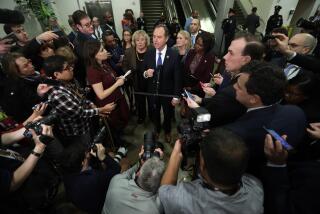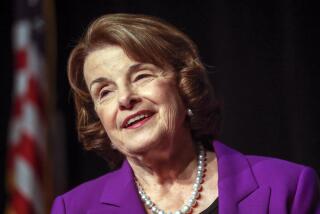A Trusty Political Animal
- Share via
SACRAMENTO — When Robert Hutchison Finch died of a heart attack at his Pasadena home early Tuesday, one day after celebrating his 70th birthday, it’s likely most Californians never had heard of him. Certainly very few people under 40. But that’s probably just as well. Many of his colleagues who became household names--H. R. (Bob) Haldeman, John D. Ehrlichman--wound up in prison.
Fame in that circle had a way of deteriorating into infamy.
Finch also might have become famous in a positive sense 25 years ago by running for the U.S. Senate, his lifetime dream. Perched at his political zenith, the Nixon Cabinet star could have won and conceivably held the seat until death. But he lacked the so-called fire in the belly. He didn’t have the stomach for the cutthroat, back-stabbing politics needed to kick aside a friend and fellow Republican, Sen. George Murphy, whose first campaign he had masterminded.
Murphy, a former Hollywood hoofer/actor hobbled by scandal and barely audible because of a throat cancer operation, ultimately lost the seat to Democrat John V. Tunney.
Soon Finch’s own career took a dive. The Haldemans and Ehrlichmans of the Watergate White House rolled over him in a power struggle that pitted southern-placating conservatives against pragmatic centrists, such as Finch. President Richard M. Nixon--Finch’s longtime friend, master, mentor and idol, who was like an older brother--sided with the hard-liners.
Finch was removed as secretary of health, education and welfare--a center of class and racial turmoil during the riotous sixties--and reined into the White House as a presidential “counselor.” There, he perished politically, hurt because he was cut out of the 1972 reelection campaign, but also escaping knowledge of the erupting Watergate scandal. He fled to California after the election to plot a failed political comeback.
But as Finch told me in a 1974 interview, “I couldn’t run for dogcatcher without it turning into a referendum on Watergate.”
*
“Sometimes you lose the battle and win the war,” Finch said, referring to the debilitating power struggle. “At least I don’t have any trouble sleeping at night.”
Finch had managed Nixon’s narrow loss to John F. Kennedy in the 1960 presidential campaign and if his old pal had turned to him again in 1972, he believed, Watergate never would have happened.
“The spying and the Mickey Mouse. . . . I’ve run campaigns all my life and we never played those kinds of games,” he said. “They had a bunch of amateurs in there . . . who were great on option papers and computers, but very little visceral politics.”
Finch was a self-described “political animal.” The son of an Arizona GOP legislative leader, he grew up in Los Angeles loving politics--student body president, party organizer--during Depression and war years when people looked to government for help.
In his youth, Finch seemed always to be in the right place at the right time--just as in the Nixon Administration he would be in the wrong place at the wrong time.
He volunteered as a congressional campaign worker for Norris Poulson, a future Los Angeles mayor, who in Washington hired Finch as his top aide. Soon the aide became good friends with freshman Rep. Nixon. And eventually Vice President Nixon chose Finch as his chief of staff.
In 1966, Finch was elected lieutenant governor--the biggest vote-getter on the ballot. That little one-upmanship led to tension between him and the new governor, Ronald Reagan, whose staff already was leery of Finch’s centrist views and friendship with Nixon.
“I am just not on the same wavelength as Reagan,” Finch once told me. “He’s a role player--the guy on the white charger.”
*
In many ways, Lt. Gov. Finch personified “the best of the best” era of California politics. And I include in this era the Democratic regime of Pat Brown that preceded Reagan. It was a period of compromise and construction--health and welfare reforms, highway and university building, water projects and environmental protection.
When people with institutional memory think of lieutenant governor, they think of Finch. He took the office briefly to a higher level. His answer to the 1965 Watts riot was not harsh law-and-order rhetoric, but a job-training program he developed for minorities. Republicanism for him was about economic opportunity, not polarizing “values.” Indeed, Finch helped lobby Reagan into signing the most liberal abortion rights act in the nation.
Finch embodied the old-fashioned values: loyalty, duty, civility, integrity.
He frequently told audiences, “History offers no consolation for failure.” He was wrong. Bob Finch’s consolation was being able to sleep well at night--and in his own bed, not a prison bunk.
More to Read
Get the L.A. Times Politics newsletter
Deeply reported insights into legislation, politics and policy from Sacramento, Washington and beyond. In your inbox twice per week.
You may occasionally receive promotional content from the Los Angeles Times.









